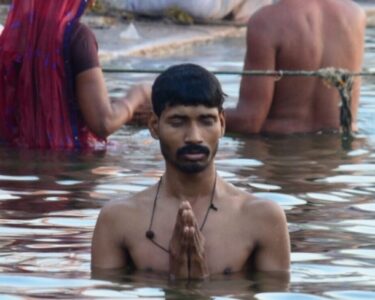SUSTAINING THE BALANCE
(as taught by Swami Vibudhesha Teertha)
These days it looks as if human beings have forgotten that a particular natural condition on Earth enabled life to come into existence and evolve to the human level. Humanity is disturbing this natural condition on which his existence, along with the existence of all other forms of life, depends. This is like the action of a woodcutter cutting a tree at the trunk, on the branch on which he is sitting. According to Hindu religion, “dharanath dharma ucyate”—that which sustains all species of life and helps to maintain harmonious relationship among them is dharma. That which disturbs such ecology is adharma.
Hindu religion wants its followers to live a simple life. It does not allow people to go on increasing their material wants. People are meant to learn to enjoy spiritual happiness, so that to derive a sense of satisfaction and fulfilment, they need not run after material pleasures and disturb nature’s checks and balances. They have to milk a cow and enjoy, not cut at the udder of the cow with greed to enjoy what is not available in the natural course. Do not use anything belonging to nature, such as oil, coal, or forest, at a greater rate than you can replenish it. For example, do not destroy birds, fish, earthworms, and even bacteria which play vital ecological roles; once they are annihilated you cannot recreate them.
Thus only can you avoid becoming bankrupt, and the life cycle can continue for a long, long time.
“Conserve Ecology or Perish”
This is the message of the Bhagavad Gita, a dialogue between Sri Krishna and Arjuna that is a clear and precise Life Science. It is narrated in the third chapter of this great work that a life without contribution toward the preservation of ecology is a life of sin and a life without specific purpose or use.
Life is sustained by different kinds of food; rainfall produces food; timely movement of clouds brings rains; to get the clouds moving on time yajna, religious sacrifice, helps; yajna is performed through rituals; those actions that produce rituals belong only to God; God is revealed by the Vedas; the Vedas are preserved by the human mind; and the human mind is nourished by food. This is the cycle that helps the existence of all forms of life on this globe. One who does not contribute to the maintenance of this cycle is considered as a destroyer of all life here.When the Lord desired to create life, He created the Sun, Moon, and Earth, and through them a congenial atmosphere for life to come into being. Therefore the Sun, Moon, Earth, Stars and all objects in the universe jointly, not individually, create the atmosphere for the creation, sustenance, or destruction of everything in the universe. The Earth is the only daughter of the Sun to produce children. The Moon is essential for the creation of the right atmosphere for those children to exist and evolve. This we say because of the influence of the Moon on high and low tides in our rivers and oceans.
This is narrated also in the Bhagavad Gita:
I become the moon and thereby supply the juice of life to all vegetables.
We cannot refute this influence of the Moon on life. It is proved by the movement of all liquid on this globe depending on the movement of the Moon. Therefore ecology in totality must be preserved: just a part of it would not suffice.
Hinduism and Nature
Hinduism is a religion that is very near to nature. It asks its followers to see God in every object in the Universe. Worship of God in air, water, fire, Sun, Moon, Stars, and Earth is specially recommended.
Earth is worshipped as the spouse of God, hence very dear and near to God. All lives on Earth are considered as children of God and Earth.
Sri Krishna in the Bhagavad Gita says:
I pervade the Universe. All objects in the Universe rest on me as pearls on the thread of a garland.
The Upanishads narrate that after creating the Universe, the Creator entered into each and every object to help them maintain their interrelationship. The Upanishad says “tat sristva ta devanu pravisat”: (“after creating the universe He entered into every object created”). Therefore to contribute toward the maintenance of this interrelationship becomes worship of God. Hindus believe that there is soul in all plants and animals.
One has to do penance even for killing plants and animals for food. This daily penance is called visva deva. Visva deva is nothing but an offering of prepared food to the Creator, asking His pardon. The Hindu religion gives great importance to protecting cattle. At every Hindu house there is a cow and it is worshipped. The cow is a great friend of humans. It nourishes us through its milk and provides manure to grow our food.
Hindus revere the Earth as mother. She feeds, shelters, and clothes us. Without her we cannot survive. If we as children do not take care of her we diminish her ability to take care of us. Unfortunately, the Earth herself is now being undermined by our scientific and industrial achievements.
Read the rest @ https://interfaithsustain.com/hindu-faith-statement-on-the-environment/






